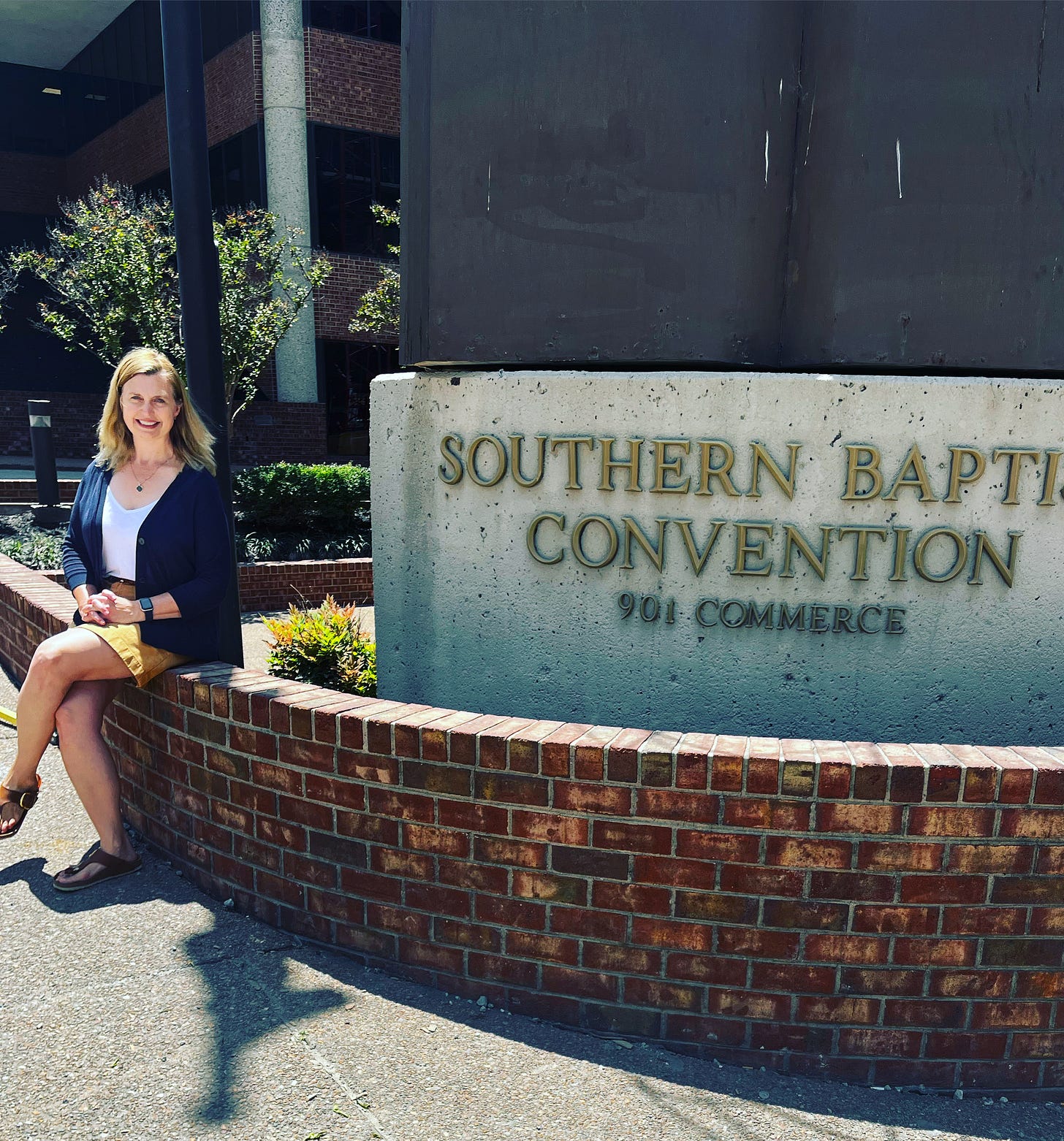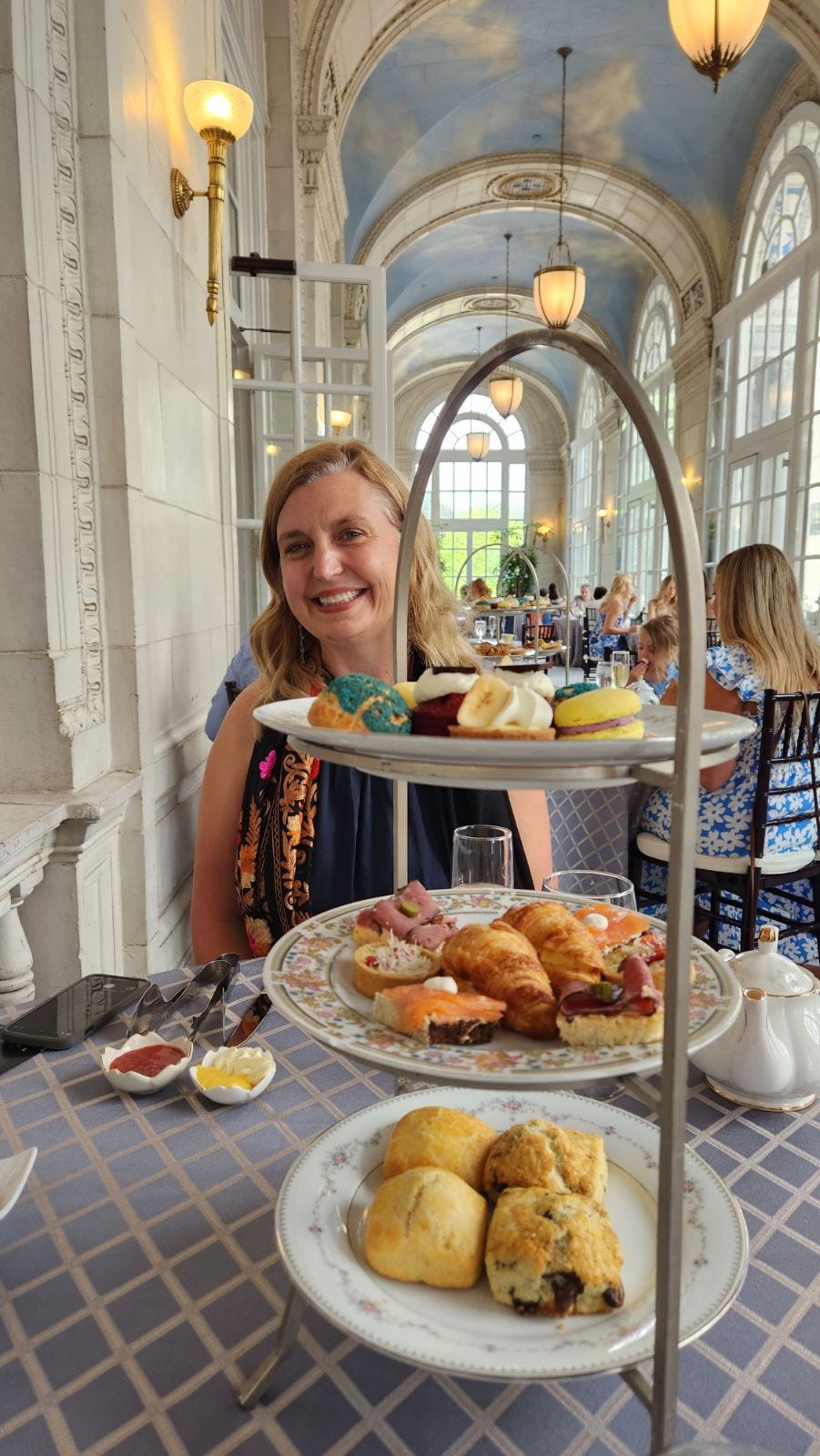I had high tea at the Hermitage Hotel in Nashville Sunday. The ornate Beaux Arts architecture of the city’s first five-star hotel, including a breathtaking painted-glass ceiling in the lobby, stands witness to the final moments of the fight to ratify the 19th Amendment. Women fighting both for and against suffrage during the hot Tennessee summer of 1920 sat under the high vaults of the Veranda, the social room elevated to the side of the lobby, just as my sister and I sat this afternoon. I’m not sure if Carrie Chapman Catt, president of the National American Woman Suffrage Association from 1900 to 1904 and author of the two-pronged plan which pushed the suffrage movement to the cusp of victory in Tennessee, would have chosen Darjeeling or Early Gray, but, for the record, I had to settle for the Cacao Chai because I don’t like bergamot and they were out of Darjeeling.
Just down the street from where we ate our smoked salmon sandwiches, the young state senator Harry T. Burn dramatically shifted his vote from “nay” to “aye,” breaking the tie and (finally!) handing women the right to vote. I have to note that white women benefited the most from the initial passage of the 19th Amendment—it took the Civil Rights movement and the Voting Rights Act of 1964 to help Black women and women of color be fully enfranchised. I also have to note that Burn switched his vote on August 18, 1920, after receiving a pointed letter from his mother……
I’m actually not in Nashville to have tea at the Hermitage Hotel. But I am here because of a vote about women—except this time the vote is whether the messengers at the 2023 Southern Baptist Convention meeting in New Orleans will rescind the SBC Executive Committee’s decision to disfellowship two of the five churches who were deemed “no longer in friendly cooperation” with the SBC because they employ female pastors (only three churches appealed the decision—two for female pastors and one for an abuse allegation; six churches altogether were disfellowshipped).
Did you know this isn’t the first time Southern Baptists have disfellowshipped churches over the ordination of women?
In 1983, messengers from three California churches were refused “seating” at the their annual local association meeting because two had ordained female deacons and one had ordained a pastor’s wife "to the gospel ministry.” The pastor’s wife, Kathy Hoppe, stated that “she had no interest in pastoral ministry and wanted to seek a chaplaincy,” but it didn’t matter. She was ordained so her church was disfellowshipped. The local association put the three churches on probation for one year, promising to restore them “to fellowship if they ceased their non-Biblical practice.”
That same year, the SBC Home Mission Board received several complaints from churches in Montana when Sarah Wood Lee, wife of an ordained pastor appointed by the Home Mission Board as a church planter, sought her own ordination. She had been commissioned alongside her husband by North Hill Baptist Church in Minot, North Dakota, and (at the time) was completing her Master of Divinity degree. When the Home Mission Board attempted to place her in the “church and family” category instead of the “Church Planter” category, she objected. This is what she wrote to Irwin Dawson, Director of Missionary Personnel Department for the Home Mission Board on September 28, 1983.
“Rev. Bob Graham as well as the church of North Hill Baptist in Minot has extended a call to me as well as my husband. Sean and I are a ministry team. I have my ministry that I will pursue in Burlington along with Sean. I understand that the HMB is only appointing Sean, but the reason we even decided the Burlington area was because I had a call from North Hill also. Please “categorize” me as ministry team partner or something to that. If you can’t, then don’t categorize me as anything. I would ask you return to your information on me to see that I too will be graduating with my husband in December with an M.Div. degree. Following that weekend I will be ordained to the gospel ministry. I choose to be a minister and not a “minister’s wife.”
Just let her words sink in: “I choose to be a minister and not a ‘minister’s wife’.”
As you might imagine, her attitude was not well received.
Pastor Ray Willis of Calvary Baptist Church in Laurel, Montana, Pastor Tom Edwards of First Baptist Church Shelby, Montana, Pastor Ron Rogers of First Southern Baptist Church Roundup, Montana, and Pastor Ronnie Mayes of First Baptist Church Forsyth, Montana objected vociferously to Lee’s ordination (as well as Hoppe)—arguing that the use of Cooperative Program money to pay the salary of Lee’s husband implied that the Home Mission Board supported women’s ordination. “The criteria,” Edwards wrote, “is not ours—it is the Bible’s.” Even the Montana Yellowstone Southern Baptist Association got involved, asking that the Home Mission Board withdraw funds from both Kathy Hoppe’s and Sarah Lee’s husbands. “We would ask that in the matter of future appointments that a more thorough screening process be undertaken to keep this from happening again.” So many churches hounded the Home Mission Board that an internal memo circulated, asking that“no further conversations or correspondence with persons in the Northern Plains convention” take place until “we have had opportunity to determine our responses and direction” as “the situation is becoming confused.”
The Home Mission Board’s initial decision was indecisive. It required that Sarah Lee be categorized as “church and family” instead of as a church planter, yet it also insisted on the autonomy of local churches to make ordination decisions. The Home Mission Board president during this time, William Tanner, protested that he personally opposed ordained women even while supporting the right of local Baptist churches to ordain women. Also, despite the furor of the Northern Plains convention in 1983 objecting to women like Sarah Wood Lee ordained to “the gospel ministry,” the Baptist State Convention of North Carolina voted in 1986 that they did “not restrict pastoral support on the basis of gender; and the local church should not be hindered in any way by Convention agencies that assist our churches in carrying out our mission.” Some Southern Baptists, in other words, continued to support the ordination of women.
History doesn’t give me much hope for the SBC to change its trajectory on female ordination, but history doesn’t allow me to give up all hope either.
I haven’t told the you whole story—only given you a few pieces (you are going to have to wait for my next book). But my point here is simple—the SBC has been voting on women (both for and against) for decades. While the momentum has been building toward banning women from all pastoral roles (which is what is on the docket for the 2023 convention in New Orleans), the counter voices have always been there too. The Home Mission Board may have officially categorized Sarah Lee as “church and family,” but that didn’t change Sarah Lee’s calling by God, commission by a church to the gospel ministry, and her own determination to “be a minister.” One of the lessons I learned from teaching suffrage this past year was never to discount the tenacity of women….
Honestly, I don’t know what is going to happen next week. Will the SBC reject or support the autonomy of local churches to ordain women? What I do know is that Baptist women will continue to do the work of God no matter how the SBC categorizes them. I also know that Baptist voices, including some in the SBC, will continue to support those who, like Sarah Lee, “choose to be a minister.”

Thanks to the Southern Baptist Convention Historical Library and Archives. The above documents are open access and can be found in the Home Mission Board Executive Office Files AR 631-3 and the Wilmer Clement Fields Papers AR 627-5.






